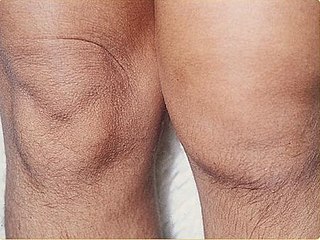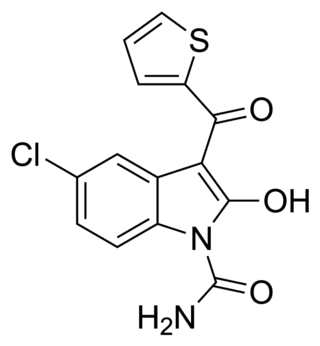
Rheumatoid arthritis (RA) is a long-term autoimmune disorder that primarily affects joints. It typically results in warm, swollen, and painful joints. Pain and stiffness often worsen following rest. Most commonly, the wrist and hands are involved, with the same joints typically involved on both sides of the body. The disease may also affect other parts of the body, including skin, eyes, lungs, heart, nerves and blood. This may result in a low red blood cell count, inflammation around the lungs, and inflammation around the heart. Fever and low energy may also be present. Often, symptoms come on gradually over weeks to months.

Gout is a form of inflammatory arthritis characterized by recurrent attacks of a red, tender, hot and swollen joint, caused by the deposition of needle-like crystals of uric acid known as monosodium urate crystals. Pain typically comes on rapidly, reaching maximal intensity in less than 12 hours. The joint at the base of the big toe is affected (Podagra) in about half of cases. It may also result in tophi, kidney stones, or kidney damage.

Sjögren syndrome or Sjögren's syndrome is a long-term autoimmune disease that affects the body's moisture-producing glands, and often seriously affects other organ systems, such as the lungs, kidneys, and nervous system. Primary symptoms are dryness, pain and fatigue. Other symptoms can include dry skin, vaginal dryness, a chronic cough, numbness in the arms and legs, feeling tired, muscle and joint pains, and thyroid problems. Those affected are also at an increased risk (15%) of lymphoma.
Rheumatology is a branch of medicine devoted to the diagnosis and management of disorders whose common feature is inflammation in the bones, muscles, joints, and internal organs. Rheumatology covers more than 100 different complex diseases, collectively known as rheumatic diseases, which includes many forms of arthritis as well as lupus and Sjögren's syndrome. Doctors who have undergone formal training in rheumatology are called rheumatologists.

Fibromyalgia (FM) is a medical condition defined by the presence of chronic widespread pain, fatigue, waking unrefreshed, cognitive symptoms, lower abdominal pain or cramps, and depression. Other symptoms include insomnia and a general hypersensitivity.

Ankylosing spondylitis (AS) is a type of arthritis characterized by long-term inflammation of the joints of the spine typically where the spine joins the pelvis. Occasionally areas affected may include other joints such as the shoulders or hips. Eye and bowel problems may occur as well as back pain. Joint mobility in the affected areas generally worsens over time.
Rheumatism or rheumatic disorders are conditions causing chronic, often intermittent pain affecting the joints or connective tissue. Rheumatism does not designate any specific disorder, but covers at least 200 different conditions, including arthritis and "non-articular rheumatism", also known as "regional pain syndrome" or "soft tissue rheumatism". There is a close overlap between the term soft tissue disorder and rheumatism. Sometimes the term "soft tissue rheumatic disorders" is used to describe these conditions.
Juvenile idiopathic arthritis (JIA) is the most common, chronic rheumatic disease of childhood, affecting approximately 16 to 150 out of 100,000 children. Juvenile, in this context, refers to disease onset before 16 years of age, while idiopathic refers to a condition with no defined cause, and arthritis is inflammation within the joint.
SAPHO syndrome includes a variety of inflammatory bone disorders that may be associated with skin changes. These diseases share some clinical, radiologic, and pathologic characteristics.

Reactive arthritis, also known as Reiter's syndrome, is a form of inflammatory arthritis that develops in response to an infection in another part of the body (cross-reactivity). Coming into contact with bacteria and developing an infection can trigger the disease. By the time the patient presents with symptoms, often the "trigger" infection has been cured or is in remission in chronic cases, thus making determination of the initial cause difficult.

Myositis is a rare disease that involves inflammation of the muscles. This can present with a variety of symptoms such as skin involvement, muscle weakness, and other organ involvement. Systemic symptoms such as weight loss, fatigue, and low fever can also present.
Ruplizumab is a humanized monoclonal antibody intended for the treatment of rheumatic diseases like systemic lupus erythematosus and lupus nephritis. A study showed that the drug was associated with life-threatening thromboembolisms, while another study only found thrombocytopenia.

Tenidap was a COX/5-LOX inhibitor and cytokine-modulating anti-inflammatory drug candidate that was under development by Pfizer as a promising potential treatment for rheumatoid arthritis, but Pfizer halted development after marketing approval was rejected by the FDA in 1996 due to liver and kidney toxicity, which was attributed to metabolites of the drug with a thiophene moiety that caused oxidative damage.
The American College of Rheumatology is an organization of and for physicians, health professionals, and scientists that advances rheumatology through programs of education, research, advocacy and practice support relating to the care of people with arthritis and rheumatic and musculoskeletal diseases.
Clenoliximab (INN) is a monoclonal antibody against CD4. It acts as an immunomodulator and has been investigated for the treatment of rheumatoid arthritis. The drug is a chimeric antibody from Macaca irus and Homo sapiens.

Lupus, technically known as systemic lupus erythematosus (SLE), is an autoimmune disease in which the body's immune system mistakenly attacks healthy tissue in many parts of the body. Symptoms vary among people and may be mild to severe. Common symptoms include painful and swollen joints, fever, chest pain, hair loss, mouth ulcers, swollen lymph nodes, feeling tired, and a red rash which is most commonly on the face. Often there are periods of illness, called flares, and periods of remission during which there are few symptoms.

Rheumatology is a monthly peer-reviewed medical journal published by Oxford University Press. It is one of two official journals of the British Society for Rheumatology, the other being Rheumatology Advances in Practice. The journal covers all aspects of paediatric and adult rheumatological conditions. The editor-in-chief is Marwan Bukhari.

Wrightington Hospital is a health facility in Wrightington, Lancashire, England. It is managed by the Wrightington, Wigan and Leigh NHS Foundation Trust.
Terri H. Finkel is an American pediatric rheumatologist and immunologist who is the Children's Foundation of Memphis Endowed Chair and tenured professor of pediatrics at the University of Tennessee Health Science Center and St. Jude Children's Research Hospital. Previously, she was the pediatrician-in-chief, chair of pediatrics and chief scientific officer at Nemours Children's Hospital. She is known for her research into autoimmunity, AIDS, juvenile rheumatoid arthritis, lupus, and cancer. Her work has been recognized in more than 200 publications, 10 U.S. patents, and 4 licensed technologies. Finkel has been placed in the top one percent of American pediatric rheumatologists by U.S. News & World Report. Her numerous honors include being named among America's Top Doctors by Castle Connolly every year since 2011 and induction into the Colorado Women's Hall of Fame in 1996.

Peficitinib is a pharmaceutical drug used for the treatment of rheumatoid arthritis. It belongs to the class of drugs known as Janus kinase inhibitors.












